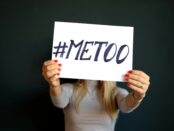Newsworthy
The newest articles featured on our homepage.
Legislative change, especially on a state level, is often a result of active constituents who contact their legislators time and time again until either the funds or dedication sets bills in motion. Legislators will focus on pleasing their constituents to ensure favorable results in upcoming elections, so how will students who are unable to vote until they are 18 years old be able to influence the enactment of similar legislation protecting their rights?
...[Continue Reading]
The issue here is not that the government does not have money for the problems that we are facing within the borders of the United States, but rather that the United States government has chosen to use the money to aid our allies and influence global foreign policy.
...[Continue Reading]
An essential aspect of the State Bar’s grievance process is the transparency it provides for the public. Limiting public access to disciplinary actions against lawyers diminishes that transparency and may even be said to go against the purpose of the State Bar to protect the public and maintain the integrity of our profession. If a prospective client is trying to find an attorney, they should be able to see that attorney’s discipline record regardless of the severity of it.
...[Continue Reading]
A growing consensus among circuit courts may destroy the hopes of litigants, dismissing an age discrimination claim if there is not an age difference of ten or more years between the plaintiff and their replacement hire.
...[Continue Reading]
Penalties for committing a crime included in the CFAA range from imprisonment for less than a year to a maximum of life imprisonment. However, it is often difficult for the government to pinpoint the exact identity of cybercriminals to bring them to justice, especially if they are located in a different country.
...[Continue Reading]
In the common law system, legal fictions have been utilized to adapt to changing circumstances and address gaps in legislation. English common law, with its emphasis on precedent and flexibility, incorporated legal fictions into its legal system to achieve justice.
...[Continue Reading]
The editing of genome cells is used in a number of ways, including treating and preventing hereditary diseases. A first case look includes a “brave” scientist by the name of He Jiankui of Shenzhen, China’s Southern University of Science and Technology, shocked the world by unveiling his unique experiment where he secretly modified the embryos of nine different couples who had biological fathers with HIV positive genes and mothers with HIV negative genes.
...[Continue Reading]
As evidenced by the cases mentioned above, defamation lawsuits wield a significant amount of power against victims. Although the First Amendment protects a wide variety of speech, including truthful statements from victims who choose to share their stories, these lawsuits are extremely effective. Facing a lawsuit, or even the mere threat of legal action can instill profound fear in victims.
...[Continue Reading]
OpenAI, the company behind ChatGPT, has a list of activities that are banned, with the risk of termination of a user’s account if the company discovers banned activity. Within these banned activities, OpenAI specifically prohibits academic dishonesty. The regulation instructs its users not to misinform, misrepresent, or mislead others.
...[Continue Reading]
Tracing ChatGPT back to its conception, the core of the programming was always the Language Learning Model. By being able to access and compress a large number of data points into a uniquely generated output mimicking speech patterns, chatbots seem to be a supreme combination of search engines and research tools.
...[Continue Reading]
. . . voting measures are opportunities for citizens of a state to propose a change in legislation or a state constitutional amendment. Ballot initiatives are commonly viewed as a pure form of democracy and may be utilized by those who feel underrepresented by their state or local politicians.
...[Continue Reading]
Without any change, local owners of veterinary practices entering retirement must either close down, find another veterinarian to buy their practice, or in many cases, submit to selling their local practice to a large national corporation.
...[Continue Reading]
As federal policymakers research and draft data privacy legislation for the entire country to follow, there is tension between these state acts and the federal government’s plan for the future of data privacy in America.
...[Continue Reading]
The 21st Amendment was passed on December 5, 1933, ending the nationwide prohibition. North Carolinian drinkers rejoiced, although their celebrations were short-lived. The state stayed true to its temperance roots and continued to enforce its state-wide prohibition for several months.
...[Continue Reading]
However, copyright laws, though helpful for larger works such as cookbooks and websites, may not be as accessible to those who create their culinary works through other individual platforms, such as food blogs, videos, and podcasts. Social media outlets create inclusive communities to build networks both to share recipes and also to copy recipes without giving credit where it is duly earned. In order to combat this, it may be up to those communities to create a shared space of respect and appreciation without relying on the legal system.
...[Continue Reading]
1
2
3
…
30
»















